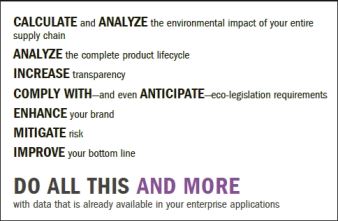Corporate Social Responsibility (CSR) is a broad concept that describes a corporate initiative to assess and take responsibility for a company’s effects on the environment and impact on social welfare that generally goes beyond what may be required by regulators or environmental protection groups.
Generally, CSR isn’t about an immediate financial benefit to the company, but rather about promoting positive social and environmental change. It’s often referred to as “corporate citizenship.”
For our customers in process manufacturing in industries such as chemicals, food and beverage, and pharmaceuticals, CSR can have broader meaning.
Challenges and Opportunities
The largest impact of CSR is probably in the chemicals industry where the focus is on a lifecycle view of emissions and pollution related to products. Raw materials will potentially contain substances that are harmful to the environment or to human beings. The manufacturing process as such may also cause emission of these substances.
The reduction of hazardous substances, therefore, is a critical issue.
Chemicals manufacturing is a high energy-consuming business; the end-use of manufactured products will likely cause exposure of potentially harmful substances; and waste management and recycling are processes that needs to be monitored and evaluated from a CSR perspective.
In the food and beverage industry, the challenges are different.
Here it’s important to be able to guarantee that the raw materials – whether they’re coffee beans or carrots – have been produced in an ethical and sustainable manner. Internal manufacturing and distribution processes must be properly designed and solid enough to prevent mistakes that in the end might cause product recalls and, potentially, huge damage to the company’s credibility and brand reputation.
Whatever the industry, the importance of and awareness about CSR has increased dramatically over the last decade.
One major reason for this is new legislation such as REACH, with a massive impact on the chemical industry within the European Union; or standards such as ISO 26000 that provides guidance on how businesses and organizations can operate in a socially responsible way.
Another aspect of CSR is as a value creator.
By innovating and promoting a sustainable business model, a company can raise its image as a responsible and ethical organization to do business with, work for or invest in. This can create competitive advantage in the marketplace – important from an investor’s point of view. Successfully implemented CSR and sustainability efforts can have a positive impact on a company’s value and results and better integrate the business with the community.
Develop a Strategy for CSR
Clearly, accurate and reliable CSR data will become increasingly important.
Companies are under pressure to document their CSR activities and integrate sustainability and financial reporting. Legislation, regulations, industry practice and customer demands all drive the need for process improvements, reporting and declarations related to CSR.
The problem for many companies is that either they have no system in place; face limitations in their current systems; or rely on third-party products or third-party integration for CSR data collection and reporting.
IFS were one of the first ERP vendors to define a strategy for CSR and start to develop solutions that support CSR and sustainability initiatives.
Today we offer a number of application modules that will speed up your implementation of CSR:
- IFS ECO-Footprint will give you clear answers about product-related emissions, from cradle to grave. It will declare potentially harmful substances built into the product, or any emissions caused in the manufacturing, transportation, end-use and decommission processes.
Depending on the industry, IFS ECO-Footprint will also help a company comply with regulations such as WEEE, RoHS and REACH. - IFS Applications also includes a complete solution for quality assurance. This will support the implementation of standards such as ISO 26000 with a complete and systematic approach to compliance planning, audit management, non-conformance reporting and corrective actions.
- In the area of workplace safety, IFS Human Resources solution includes incident reporting and management, risk assessment and safety inspections.
All this is offered in one single product, IFS Applications, built on a single technology. It means that all functionality is available and works in a seamless fashion without any additional delays or complex integrations.
We believe our customers are well positioned to continue to implement CSR, to act as responsible members of society and create value for all stakeholders.
- If you are already using IFS Applications, or looking for a new ERP solution that will support your sustainability efforts, we have a comprehensive whitepaper available for free download: Selecting ERP for ISO 26000 compliance.

emy
Thanks For Your valuable posting,This is for wonderful sharing,I would like to see more information from your side.I am working in Erp In India